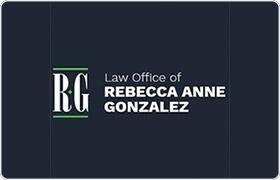Universal City Divorce & Family Law Lawyer, Texas, page 2
Sponsored Law Firm
-
 x
x

Click For More Info:
-
Law Office of Rebecca Anne Gonzalez
10101 Reunion Place Suite 615 San Antonio, TX 78216» view mapDivorce & Family Law Continuing The Gonzalez Legacy
At the Law Office of Rebecca Anne Gonzalez, my goal is to make certain you feel taken care of. My team and I work hard to protect what is important to you.
800-735-1530
Allen Webster Church
Real Estate, Dispute Resolution, Business & Trade, Family Law
Status: In Good Standing Licensed: 51 Years
Brian Hun Adams
Criminal, Family Law, Administrative Law, Employee Rights
Status: In Good Standing Licensed: 16 Years
 Rebecca Gonzalez San Antonio, TX
Rebecca Gonzalez San Antonio, TX Practice AreasExpertise
Practice AreasExpertise
